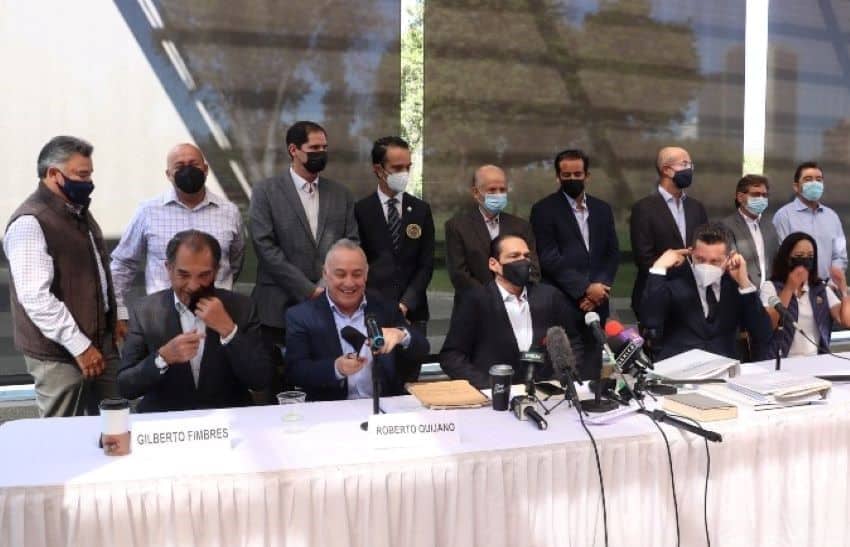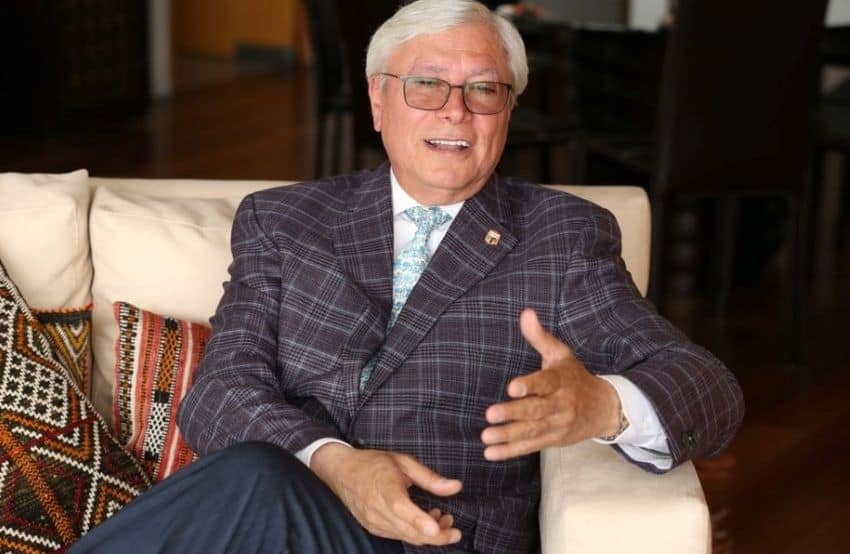A legal battle is brewing over the Baja California government’s plan to expropriate the exclusive Tijuana Country Club and its 18-hole golf course and convert the green space into a public park for residents of the densely populated border city.
The government, led by Morena party Governor Jaime Bonilla, published a decree last week that outlined its intention to expropriate the property, located in an affluent part of Tijuana. It states that people opposed to the project have 15 days to lodge their complaints with the state government.
The 15-day period will expire next Wednesday.
Bonilla has proposed converting the 50 hectares of the 73-year-old club — known locally as Club Campestre Tijuana — into a public space for sporting and cultural activities. He argues that it is one of the few green areas in Tijuana, which has few parks, that can be redeveloped for that purpose.
“With the growth of Tijuana — it’s the most densely populated city in the country — it doesn’t have lungs, and young people in the neighborhoods don’t have anywhere to play. There are no green spaces,” Bonilla said after the publication of the decree in the government’s official newspaper on April 13.

“I say: there’s the green space [at the country club], we have to make a big park … for the people — with swimming pools, games for children, theater, an amphitheater, all that fits there,” he said.
The governor said the publication of the decree was the first step in the process to hand over the country club land to the people so that it is no longer the exclusive domain of just 800 members.
“The country club should be in the hands of … its legitimate owners [the people]. I said it in the [2019] campaign [for governor],” Bonilla said.
“… There are people who have lived in Tijuana for 40 years and they don’t know the [Tijuana] Country Club; they can’t even gain access to the parking lot,” he said.
Bonilla said that past governments improperly allocated the club to the current owners. (According to members, it is registered as belonging to Club Campestre Tijuana.)
“I have nothing against private property, I’m pro-private property but when it [really] is private property. You can’t call something private property … that is yours now because previous governments” transferred it dishonestly, the governor said.
The news agency Reuters reported that ownership of the property has been disputed for decades, “with the government saying it was not properly transferred to new owners in 1969, after the deaths of two joint owners.”
The newspaper Milenio reported that an announcement by Bonilla late last year that his government would expropriate the club came after a disagreement with then Tijuana mayor Arturo González Cruz.
Cruz was seeking to become Morena’s candidate for governor at this year’s election. González, who was unsuccessful in securing the candidacy, is a former president of the Tijuana Country Club.
Addressing the media last week, Bonilla asserted that the club got away with not paying its taxes due to complicity with past governments. His government cites property tax and water debts as further justification for expropriating the property.
Mario Gastón Toledo Castillo, president of the country club board, rejected the governor’s claims.
“Those who assert that we’re not the legitimate owners are lying,” he told a press conference. “They’re falsely saying … that the country club has debts,” Toledo added.

Although Bonilla asserted that the plan is not designed to win votes at the upcoming elections in Baja California, the optics for Morena — which could be seen as playing a Robin Hood-type role — could help it electorally.
The party’s candidate for governor, Marina del Pilar Ávila Olmeda, said the arguments of both sides must be heard and that any decisions related to the expropriation plan must be taken in accordance with the law.
In an interview with Reuters on Monday, Baja California Government Secretary Amador Rodríguez stuck to the “public good” line proffered by the governor.
“Studies have shown that what we need for Tijuana is an area that would raise the standard of living,” he said.
“The expropriation will be decreed” 15 days after the publication of the expropriation plan if there is no challenge to it. Whoever the courts recognize as the legal owners will receive more than 1.2 billion pesos (US $60.2 million) compensation over a period of two years, Rodríguez said.
The government won’t reach that point easily since there is most certainly opposition to the government’s plan. According to the newspaper Reforma, members of the Country Club are preparing a torrent of injunction requests. Adolfo Solis, a lawyer for the club’s members, said legal action has already begun.
Property ownership is one of the most important rights, he said. Such an expropriation would set a dangerous precedent.
“Any opponent, any journalist or any official, any group that is not aligned with the government, could simply have their property removed,” Solis said. “This debate is going to be won in the courts.”
Toledo, the club president, also expressed confidence that the club will win the battle.
Roberto Quijano Sosa, a club spokesman, said the expropriation plan “stinks of political revenge between two politicians,” an apparent reference to Governor Bonilla and former mayor González. “It doesn’t smell of a social claim,” he said.
Lupita Jones, who will represent an alliance of the PAN, PRI, and PRD parties at the June 6 gubernatorial election, blasted Bonilla for his expropriation plan and warned that his government could also attempt to take away the homes and businesses of everyday citizens.
President López Obrador, who founded Morena, said Tuesday that he was looking into the matter.

There is also opposition to the expropriation plan among residents of neighborhoods that adjoin the Tijuana Country Club.
“The residents … are worried about the right to own private property because, with your hands on your waist, they could strip you of your wealth – that generates uncertainty,” said Eduardo de la Peña, head of a residents’ group in the neighborhood of Hipódromo Chapultepec.
The Tijuana-based news website Uniradio Informa reported that residents have warned that they will protest and could even set up human blockades to stop any attempted government “invasion” of the country club.
De la Peña said that people who live near the club are worried that the value of their properties will significantly decline if the land is expropriated and turned into a public park.
“… We have special affection for the country club,” he added. “We had our graduations here, it’s part of the history of Tijuana.”
Source: Reuters (en), Milenio (sp), Reforma (sp), Uniradio Informa (sp)
